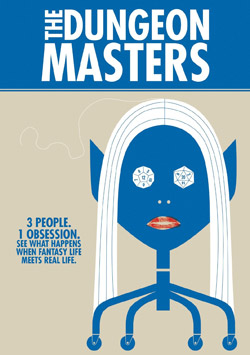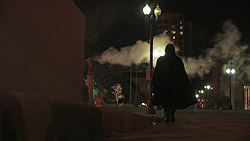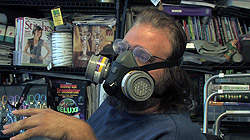
The Dungeon Masters

THE DUNGEON MASTERS (DOCUMENTARY)
Saving Throw Productions/Standard Pictures/Antidote Films
Release date: 6 August 2010
Certificate (UK): PG
Running time: 87 mins
Director: Keven McAlester
Cast: Elizabeth Reesman, Richard Meeks, Scott Corum
I am, quite proudly, a bit of a geek: I know the words ‘klaatu barada nikto’, I know who Pote Snitkin is, I know which sector of space Hal Jordan, the Green Lantern, patrols. I have also spent a fair share of time playing on computer games; conquering fantastical lands, stealing cars, killing bad guys and guiding Fulham to the Premier League title.
I have also wiled away the hours in my youth painting minute Orcs and Elves. To your average person, I am a full-on geek. However, when I walk into a comic book shop I am massively out of my depth. I have also never really played any role-playing games – I have never been sucked into Azeroth where the online game World of Warcraft takes place. So whilst I may consider myself a geek, when The Dungeon Masters started, I was well aware that they were on a whole other plain of existence.
The film is a documentary looking at the lives of three Dungeons & Dragons ‘game masters’. Elizabeth Reesman, Richard Meeks and Scott Corum are three people who are highly comitted to being the runners of D&D games – they set the scenario and plot contrivances for a group of characters belonging to the other players and then, in turn, each player must decide how to react to each specific event.

In an interview with Indiewire, director Keven McAlester stated that idea was to make a film about “these great storytellers, who really gain no recognition for it outside this community,” and what the film turns out to be is a candid look at the lives of these people. This is not a film about gaming but about the lives of three gamers.
In a very similar way to the 2008 documentary The King of Kong by Seth Gordon, a film about two computer-gaming Donkey Kong obsessives, this film starts out whimsically looking at the out-there craziness of D&D gamers; the opening sees Scott donning the outfit of his cable TV character Uncle Drac and our introduction to Elizabeth sees her in the full outfit of her character, a dark elf, in full black body paint. The music is jaunty and we are told of how Richard – who reminds of David Brent in his opening interview – once decided on a whim to kill all of the players in a campaign which he had been running for years.
However, once the documentary is done introducing the gaming, what we are treated to instead are insights into three people’s lives. Scott is married with a young son, but has struggled to carve out a career for himself. When the film starts he has decided to finally write the book that he has longed to – a fantasy adventure – and we are able to go along to see how this pans out for him. We see Richard’s life with his wife and the trials of running long-standing campaigns with players he knows well. We see Elizabeth’s struggle to find a partner or a satisfying career.

The fact that we only get to spend a small amount of time with each of these three does mean that you are not highly invested in their struggles however you can argue that they do not have compelling enough ambitions that they could fill a whole hour and half themselves. There are small moments though where McAlester gets to observe touching and subtle things. The difficulties that Scott’s wife has with his lifestyle and his own insecurities about how she feels are made clear through a number of small exchanges, as well as seeing Scott’s crusade to get his novel published and to start his own cable TV show about a failed supervillain.
Richard is forced to confront his past when he visits the son of his ex-wife who he raised and then walked out on. Elizabeth reveals the troubles of her own past and we see the beginning and end of a relationship with a fellow gamer.
It is these small moments of clarity and of observation that the film has it’s triumphs rather than to do with the gaming. People are people and this film is just looking at them. Similarly to Werner Herzog’s Encounters at the End of the World though, the films lacks an overall theme (outside of their mutual love for D&D) to bring their stories together.

We are treated to resolutions for each of them to tie up the end of the film, but ultimately, it makes curious but in no way compelling viewing – especially when compared to something in a similar vein like The King of Kong. It is nice to see though that, despite the early sniggers, the people’s passion is not treated condescendingly by the film-makers – any eye-rolling is left to either their spouses or to yourself as an audience member. The irony of Elizabeth criticising an ex-boyfriend for being too geeky whilst painted black and dressed as an elf is not lost on us or her.
If you enjoy documentaries then this may well be worth a look and if you are a big D&D fan then you may also enjoy it. Ultimately though, it’s a brief look at a moment in the lives of three people who share a passion, however unlike more successful docs, these are not necessarily three stories that were in desperate need of telling.

Ben Nicholson
Ben has had a keen love of moving images since his childhood but after leaving school he fell truly in love with films. His passion manifests itself in his consumption of movies (watching films from all around the globe and from any period of the medium’s history with equal gusto), the enjoyment he derives from reading, talking and writing about cinema and being behind the camera himself having completed his first co-directed short film in mid-2011.
His favourite films include things as diverse as The Third Man, In The Mood For Love, Badlands, 3 Iron, Casablanca, Ran and Grizzly Man to name but a few.
Ben has his own film site, ACHILLES AND THE TORTOISE, and you can follow him on Twitter @BRNicholson.
© 2012 STATIC MASS EMPORIUM . All Rights Reserved. Powered by METATEMPUS | creative.timeless.personal. | DISCLAIMER, TERMS & CONDITIONS
HOME | ABOUT | CONTACT | TWITTER | GOOGLE+ | FACEBOOK | TUMBLR | YOUTUBE | RSS FEED
CINEMA REVIEWS | BLU-RAY & DVD | THE EMPORIUM | DOCUMENTARIES | WORLD CINEMA | CULT MOVIES | INDIAN CINEMA | EARLY CINEMA
MOVIE CLASSICS | DECONSTRUCTING CINEMA | SOUNDTRACKS | INTERVIEWS | THE DIRECTOR’S CHAIR | JAPANESE CINEMA

 Please wait...
Please wait...



